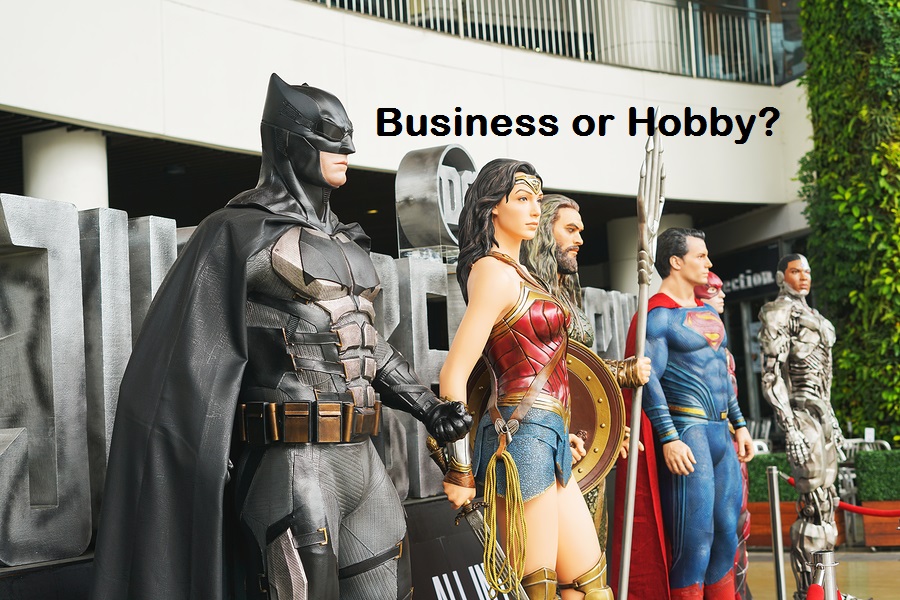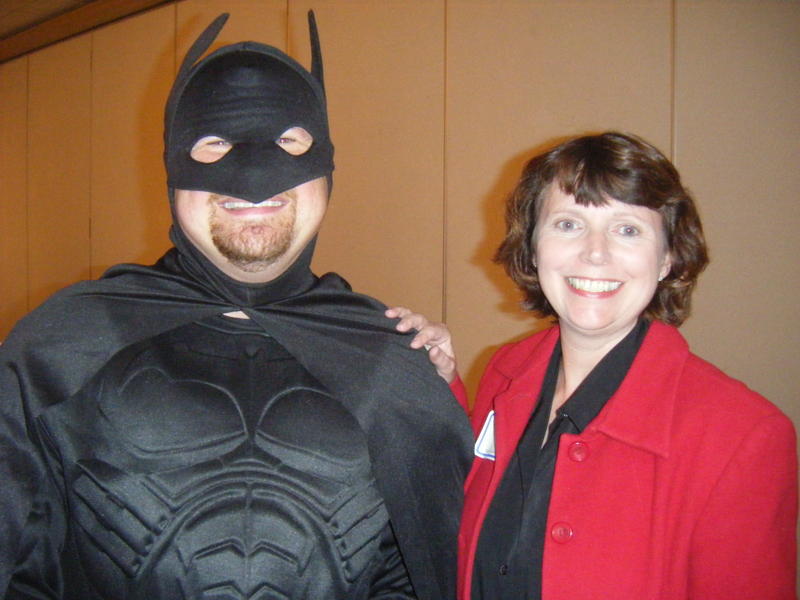
Photo of life size action figures at a gaming event in Thailand.
Updated December 6, 2018
Batman stopped by my office the other day. He usually doesn’t visit me in his Bat costume, but he had just done a charity fundraiser as Batman and had promised the ladies in my office to visit us in costume. (I’d just like to point out that not all of my friends and clients are super heroes. I do know plenty of normal people.)
I once did a post about a fellow who made a business out of appearing as Superman. On a good day, Superman can take in some decent money. After Batman’s successful fundraiser, he kind of wondered aloud about following in Superman’s footsteps and making occasional appearances for pay also. While I recently made the case for Superman being a legitimate business, Batman’s income I believe would be a hobby.
How do you tell if something is a business or a hobby? Sometimes it’s kind of hard to tell. Everybody recognizes that if you open up an Ace Hardware store selling tools and duct tape you’ve got yourself a real business. But what if you make purses and wallets out of duct tape and sell them at craft fairs? Where does that fit in? What if you breed your champion Cocker Spaniel and sell the puppies? Dog breeding is a real business, but how many litters makes you a breeder? It’s not all black and white. Here are some guidelines to help you.
First, I want to point out the most important key ingredient that the IRS uses to determine if you are a real business: a 1099MISC showing an amount under “non-employee compensation.” There are numerous guidelines as to what constitutes a business versus a hobby and this one is never mentioned. Yet it’s the most important factor as far as the IRS is concerned! If you receive a 1099MISC, the IRS counts that as self-employment and they will tax you not just income tax, but an additional 15% self employment tax. As a professional preparer, if I see one of those, even if I truly believe that your business should be classified as a hobby, I’m preparing a Schedule C showing you as a business. That’s how the IRS is treating that income.
What’s the difference in how your income is classified and why is it important? Business income is taxed at your regular income tax rate plus the self employment tax rate. Let’s say your regular tax rate is 22%, then your business income is taxed at 37% (22% + 15% = 40%.) The advantage of being treated as a business is that you can write off your direct business expenses against the income and you can even have a loss that will offset your other income.
Hobby income is taxed at your regular tax rate, there is no self employment tax so you pay less tax on hobby income. The big disadvantage to claiming income as hobby income is that under the new tax law for 2018, you can’t deduct your Hobby expenses. (Although to be fair, it wasn’t a very good deduction before 2018 anyway.)
You cannot switch your business back and forth from hobby to business depending upon whether or not you have a profit or loss. It’s okay to grow your hobby into a business. It’s even okay to downgrade your business into a hobby. But flip flopping for the sake of lowering your taxes is just going to land you in trouble with the IRS. You need to put a little thought into it before you start claiming business losses.
If you’re not receiving 1099 MISC forms, what other tests can you use to prove your business is real and not a hobby? One is the three year test–if you’ve shown a profit in three out of the past five years, then you’re considered a business. This is a good rule, but it’s not completely hard and fast. There are court cases proving businesses to be valid even though they’ve shown losses for more than three years. Even though its a good rule of thumb, I don’t like to see people get too hung up on it, there are other tests.
Is the business carried out with the intention to make a profit? Does the taxpayer (or the taxpayer’s advisors) have the knowledge to make the business a success? Does the taxpayer spend enough time on the business to indicate a profit motive? Has the taxpayer made a profit on similar activities in the past? The answers to these questions is why I put Superman in the business category and not the hobby category. Superman had previous paid experience as a costumed character and model, and he also had a website devoted to his business and posted blogs about how to be a superhero. He clearly devotes a great deal of time to his business. Batman,on the other hand, wouldn’t really pass these tests, that’s why I consider his income to be hobby income.

Me with my Batman friend back in 2010
One final point. Batman takes offense at Batman being labeled as a hobby. “Batman isn’t a hobby, it’s a calling.” Like I said in the beginning, some of my friends are normal.

Hi Kathryn,
As a hobby, not a business, you do not have to issue a 1099MISC to the studio. If you change your status, and your class becomes a business, then you would.